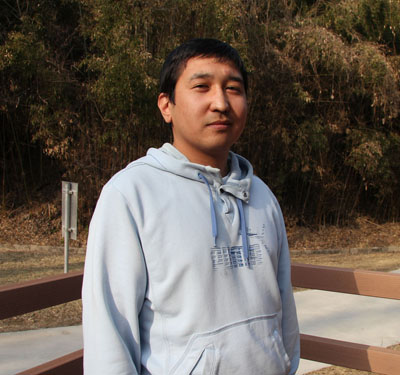On February 17, a new club called KUAT was founded. KUAT is the first cultural club at KAIST that has a common regional background as its basis of foundation. The club has passed the KAIST Undergraduate Club Union’s preliminary registration and is pending to become an official club starting next semester. The KAIST Herald met with Yerbol Absalyamov, the founder and representative member of the club, to learn more about KUAT.
Could you briefly introduce yourself?
My name is Yerbol and this is my eighth semester at KAIST. I’m from Kazakhstan and I’m majoring in Aerospace Engineering.

What is KUAT?
Our club can be explained by the origin of our name. Each letter in the abbreviation stands for multiple words: K stands for KAIST, Kazakhstan and Kyrgyzstan, U for Uzbekistan, A for Azerbaijan and T for Tajikistan, Turkey and Turkmenistan. Also, the pronunciation of KUAT is similar in all of our languages, and it means power. We are around 50 to 60 students from these seven countries, and we have many things in common such as language, culture, tradition, etc. In the club, we have an opportunity to share and empathize with each other.
What inspired you to create this new club?
When I was a freshman, I enrolled to the KAIST International Student Association (KISA). But after a while, I realized that even though KISA does organize social events for foreign students, they weren’t enough. The international student body is composed of students from all around the world but these events never seemed to reach out to every one of us.
I have many Kazakh friends living in the US and many of them have told me that they have their own national club within their universities that organize cultural events for the entire school. Also, last summer I met our club supervisor Cafer T Yavuz, who is the Assistant Professor at EEWS. He is a Turkish professor who came from the US, and he happened to be the founder of a similar cultural club at his previous school. After talking to him, I was further inspired to create KUAT to realize my ideas.
What are some of the events that you plan to organize?
Our plans can be categorized into three main areas. First, we will hold traditional celebrations common to Central Asian countries such as Nowruz, Kurban and Independnece Day, which commemorates the collapse of the USSR.
The second category we have planned is to provide KAIST students with a chance to learn about our cultures. We will hold free language courses in Turkic and Persian languages as well as Russian.
The third category is service, in which we provide community service as a group both in school and outside of school.
We have already held the Nowruz festival on April 11, which is a cherry blossom or spring festival that is common in the seven countries that we represent. Around 200 students attended, including people from the embassies of some of our respective countries. We cooked our national foods and played music. We thought the Nowruz celebration was relatively successful considering this was the first event that we organized.
How are you advertising the club to gain more members and attention from the school?
Together with Professor Caver we held a meeting where we explained the purpose of our club and the goals we want to achieve. All the KAIST students with backgrounds in the aforementioned countries were invited. A few Turkish and Kazakh students from Chungnam National University came to the presentation as well. Also, we have close connections with several cultural centers in Seoul that provide us with opportunities to promote our culture, such as letting us borrow traditional clothing to wear during the festivals that we will hold.
How do you think KUAT will help the international students of KAIST?
Back in Kazakhstan, I was aware of Korea through companies such as Samsung and LG and events such as the 2002 World Cup. However, it was when I came here that I really learnt about Korea and its culture. What I want is for Koreans to have a better understanding of our culture as well through the events KUAT will hold, just like I have become familiar with Korea while living here. Through sharing our culture and engaging in these social events, I want the international students at KAIST to have these memories to think back on rather than only having their strenuous academic lives to remember.
Do you have any last comments?
Firstly I’d like to thank the people who attended the Nowruz festival, and I hope that you will also enjoy the events that we plan to organize in the future. Your continual support would be much appreciated. Thank you.

